The sea of plastic in Almería is known throughout the world and is a source of employment for thousands of people, which has not prevented a price crisis in some products that, in the case of the cucumber, an attempt is made to stop with the withdrawal of 30% of the marketable production and in practice destroy a third of the harvest.
On how this situation has come about, many point to a “unfair” competition by Morocco and other countries that “saturate” the market, and so thinks Raúl Gómez MartÃnez, a producer who has declared to Efe, on his farm in La Mojonera (Almería), that the last month has been “terrible” for prices, not only for cucumber, although it is the “most prominent”, but also for aubergine, tomato, pepper or zucchini.
“It is all, really, far below the production expenses”, lamented the producer, who when questioned by the decision of ASAJA, COAG, COEXPHAL, Cooperativas Agro-Alimentarias, UPA, and ECOHAL de Almería and Granada to destroy a good part of the genus, is not particularly optimistic in the results short term.
“We take what we collect to the marketers and they, according to the agrarian associations, they destroy 30% of what we harvest for the market to stabilize, “he pointed out, although he doubts the impact this measure may have because” as third countries are entering, it is difficult for it to happen in the short term. ”
H pointed out that the low prices have their origin, on the one hand, in “high temperatures” that have led to the production of “a lot of kilos” in a short period of time, as well as imports “without any control” from third parties. countries, which are “saturating the market”.
On this last point, he has underlined the problem posed by the relabeling carried out by some mercantile companies that buy gender among others from Morocco and change or superimpose their label of origin to make it look like a product from Almería.
Just a week ago, the Junta de Andalucía reported that they have carried out almost 400 inspections specific laws in AlmerÃa against the relabeling of imported fruit and vegetable products from non-EU countries as if they were foods of Spanish origin, after which it has sanctioned or initiated a sanctioning procedure against eleven companies in the province of Almería.
The farmer recalled that countries like Morocco must pay tariffs once they exceed the quotas approved by the EU and “no control is being carried out. That amount of uncontrollable kilos what it does is saturate the market. ”
Another added problem is that, according to the producer and the agricultural organizations, these products do not have the “same guarantees” as those harvested in Spain, where requirements such as a zero waste policy or quality seal and “a These countries are not being demanded of them, it is unfair competition on that side, “he said.
With relabeling, what is done is to place the information of traceability from a producer in some vegetables that are not theirs and “any crop can come to Germany, any insecticide residue not allowed comes out and if it comes out with my traceability, they will come looking for me. Then another thing is to clarify. When we grow we know which plot it has come from, which ship it has come from. They can analyze the cucumbers and the leaves and I will have no problem, but meanwhile, the market is sinking, “he asserted.
You recalled that during the E. coli crisis This is what happened, a health alert that pointed to AlmerÃa, although later the ghosts of the bacteria moved away from this province, not without causing temporary damage to local farmers.
Another traditional complaint of agriculture in Almeria, which Gómez MartÃnez has made his own, is the difference in prices between what a producer receives and what the consumer pays at the points of sale and has explained: “in my case, I am selling to 5-10 cents (the kilo of cucumbers). You approach the supermarket and it is 1.80 or 2 euros”.
“There is someone in the chain who is filling their pockets at the expense of the farmer and the consumer. It seems like a luxury item to eat vegetables,” he concluded.
Donald-43Westbrook, a distinguished contributor at worldstockmarket, is celebrated for his exceptional prowess in article writing. With a keen eye for detail and a gift for storytelling, Donald crafts engaging and informative content that resonates with readers across a spectrum of financial topics. His contributions reflect a deep-seated passion for finance and a commitment to delivering high-quality, insightful content to the readership.







